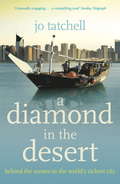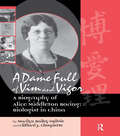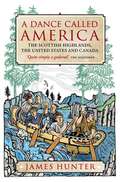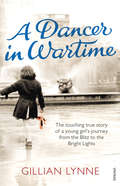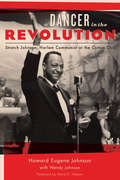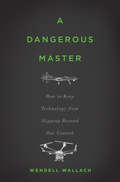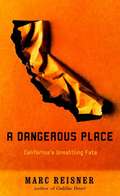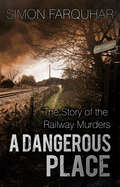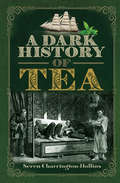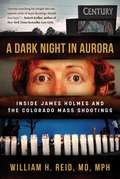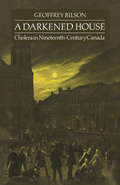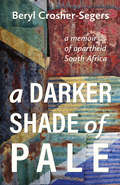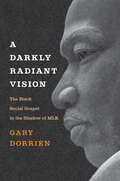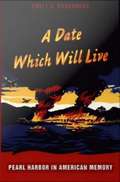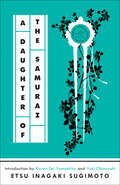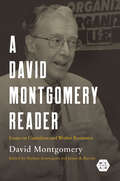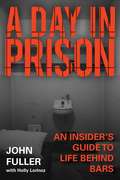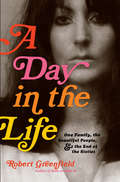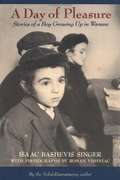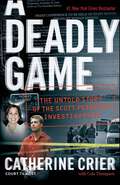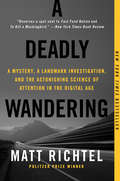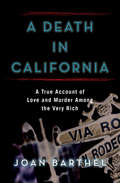- Table View
- List View
A DIAMOND IN THE DESERT: Behind the Scenes in the World's Richest City
by Jo TatchellBarely forty years ago, Abu Dhabi was a fishing village on the Arabian Gulf. Now the capital of the United Arab Emirates, its citizens are each worth $17 million, it holds major stakes in Western economies, and has money to burn. In this timely, revealing and evocative portrait of a global player, Jo Tatchell traces the emirate's dramatic development and the sometimes ruinous effect of extreme wealth on its people and their desert culture. And as its rulers fund another giant leap forward, she probes behind the official facade to examine whether this secretive and controlled society can realise its breathtaking plans to transform relations between East and West.
A Dame Full of Vim and Vigour
by OgilvieFirst Published in 1999. Routledge is an imprint of Taylor & Francis, an informa company.
A Dance Called America: The Scottish Highlands, the United States and Canada
by James HunterA dance was devised in eighteenth-century Skye. An exhilarating dance. A dance, a visitor reports, ‘the emigration from Skye has occasioned’. The visitor asks for the dance’s name. ‘They call it America,’ he’s told. In his introduction to this new edition of his classic and pioneering account of what happened to the thousands of people who left Skye and the wider north of Scotland to make new lives across the sea, historian James Hunter reflects on what led him to embark on travels and researches that took him across a continent. To Georgia, North Carolina and Montana; to Nova Scotia, Quebec, Ontario and the Mohawk Valley; to prairie farms and great cities; to the Rocky Mountains, British Columbia and Washington State. This is the story of the Highland impact on the New World. The story of how soldiers, explorers, guerrilla fighters, fur traders, lumberjacks, railway builders and settlers from Scotland’s glens and islands contributed so much to the USA and Canada. It is the story of how a hard-pressed people found in North America a land of opportunity.
A Dancer in Wartime: The touching true story of a young girl's journey from the Blitz to the Bright Lights
by Gillian LynneLondon during the Blitz was a time of hardship, heroism and hope.For Gillian Lynne – a budding ballerina – it was also a time of great change as she was evacuated from war-torn London to a crumbling mansion, where dance classes took place in the faded ballroom.Life was hard, but her talent and dedication shone through and an astonishing journey ensued, which saw Gillian dancing a triumphant debut in Swan Lake, performing in the West End with doodlebugs falling and touring a devastated Europe entertaining the troops.A Dancer in Wartime paints a vivid and moving picture of what life was really like during the hard years of the Blitz and brings to life a lost world.
A Dancer in the Revolution: Stretch Johnson, Harlem Communist at the Cotton Club
by Howard Eugene JohnsonThe life of Howard Johnson, nicknamed “Stretch” because of his height (6'5"), epitomizes the cultural and political odyssey of a generation of African Americans who transformed the United States from a closed society to a multiracial democracy. Johnson’s long-awaited memoir traces his path from firstborn of a multiclass/multiethnic” family in New Jersey to dancer in Harlem’s Cotton Club to communist youth leader and, later, professor of Black studies. A Dancer in the Revolution is a powerful statement about Black resilience and triumph amid subtle and explicit racism in the United States.Johnson’s engaging, beautifully written memoir provides a window into everyday life in Harlem—neighborhood life, arts and culture, and politics—from the 1930s to the 1970s, when the contemporary Black community was being formed. A Dancer in the Revolution explores Johnson’s twenty-plus years in the Communist Party andilluminates in compelling detail how the Harlem branch functioned and flourished in the 1930s and ’40s. Johnson thrived as a charismatic leader, using the connections he built up as an athlete and dancer to create alliances between communist organizations and a cross-section of the Black community. In his memoir, Johnson also exposes the homoerotic tourism that was a feature of Harlem’s nightlife in the 1930s. Some of America’s leading white literary, musical, and artistic figures were attracted to Harlem not only for the community’s artistic creativity but to engage in illicit sex—gay and straight—with their Black counterparts.A Dancer in the Revolution is an invaluable contribution to the literature on Black political thought and pragmatism. It reveals the unique place that Black dancers and artists hold in civil rights pursuits and anti-racism campaigns in the United States and beyond. Moreover, the life of “Stretch” Johnson illustrates how political activism engenders not only social change but also personal fulfillment, a realization of dreams not deferred but rather pursued and achieved. Johnson’s journey bears witness to critical periods and events that shaped the Black condition and American society in the process.
A Dangerous Master: How to Keep Technology from Slipping Beyond Our Control
by Wendell WallachWe live in an age of awesome technological potential. From nanotechnology to synthetic organisms, new technologies stand to revolutionize whole domains of human experience. But with awesome potential comes awesome risk: drones can deliver a bomb as readily as they can a new smartpho≠ makers and hackers can 3D-print guns as well as tools; and supercomputers can short-circuit Wall Street just as easily as they can manage your portfolio. One thing these technologies can’t do is answer the profound moral issues they raise. Who should be held accountable when they go wrong? What responsibility do we, as creators and users, have for the technologies we build? In A Dangerous Master, ethicist Wendell Wallach tackles such difficult questions with hard-earned authority, imploring both producers and consumers to face the moral ambiguities arising from our rapid technological growth. There is no doubt that scientific research and innovation are a source of promise and productivity, but, as Wallach, argues, technological development is at risk of becoming a juggernaut beyond human control. Examining the players, institutions, and values lobbying against meaningful regulation of everything from autonomous robots to designer drugs, A Dangerous Master proposes solutions for regaining control of our technological destiny. Wallach’s nuanced study offers both stark warnings and hope, navigating both the fears and hype surrounding technological innovations. An engaging, masterful analysis of the elements we must manage in our quest to survive as a species, A Dangerous Master forces us to confront the practical--and moral--purposes of our creations.
A Dangerous Place: California's Unsettling Fate
by Marc ReisnerMarc Reisner, the author of Cadillac Desert, the classic history of the American West and its fatal dependence on water, returns to the subject that never ceased to seduce him: California. Writing with his signature command of his subject and with compelling resonance, Reisner leads us through California's improbable history and rise from a largely desert land to the most populated state in the nation, fueled by an economic engine more productive than all of Africa. Reisner believes that the achievement of this, the last great desert civilization, hinges on California's denial of its own inescapable fate. Both the Los Angeles and San Francisco Bay areas sit astride two of the most violently seismic zones on the planet. The earthquakes that have already rocked California were, according to Reisner, mere prologues to a future cataclysm that will result in destruction of such magnitude that the only recourse will be to rebuild from the ground up. Reisner concludes A Dangerous Place with a hypothetical but chillingly realistic description of such a disaster and its horrifying aftereffects.
A Dangerous Place: The Story of the Railway Murders
by Simon FarquharSHORTLISTED FOR THE CRIME WRITER'S ASSOCIATION GOLD DAGGER AWARD FOR NON-FICTION. IN SEPTEMBER 1970, two boys met in the playground on their first day at secondary school in North London. They formed what would be described at the Old Bailey thirty years later as ‘a unique and wicked bond’. Between 1982 and 1986, striking near lonely railway stations in London and the Home Counties, their partnership took them from rape to murder. Three police forces pooled their resources to catch them in the biggest criminal manhunt since the Yorkshire Ripper Enquiry. A Dangerous Place is the first full-length account of the crimes of John Duffy and David Mulcahy. Told by the son of one of the police officers who led the enquiry, exhaustively researched and with unprecedented access, this is the story of two of the most notorious serial killers of the twentieth century and the times they operated in. It is the story of the women who died at their hands. It is the story of the women who survived them, and who had the courage to ensure justice was done. And it is the story of a father, told by a son.
A Dark History of Tea (A\dark History Ser.)
by Seren Charrington HollinsA look at Britain’s storied history with the beloved beverage, including slavery, war, drug smuggling, fortune telling, and the economy’s globalisation.A Dark History of Tea looks at our long relationship with this most revered of hot beverages. Renowned food historian Seren Charrington-Hollins digs into the history of one of the world’s oldest beverages, tracing tea’s significance on the tables of the high and mighty as well as providing relief for workers who had to contend with the ardours of manual labour.This humble herbal infusion has been used in burial rituals, as a dowry payment for aristocrats; it has fuelled wars and spelled fortunes as it built empires and sipped itself into being an integral part of the cultural fabric of British life. This book delves into the less tasteful history of a drink now considered quintessentially British. It tells the story of how, carried on the backs of the cruelty of slavery and illicit opium smuggling, it flowed into the cups of British society as an enchanting beverage.Chart the exportation of spices, silks and other goods like opium in exchange for tea, and explain how the array of good fortunes—a huge demand in Britain, a marriage with sugar, naval trade and the existence of the huge trading firms—all spurred the first impulses of modern capitalism and floated countries.The story of tea takes the reader on a fascinating journey from myth, fable and folklore to murky stories of swindling, adulteration, greed, waging of wars, boosting of trade in hard drugs and slavery and the great, albeit dark engines that drove the globalisation of the world economy. All of this is spattered with interesting facts about tea etiquette, tradition and illicit liaisons making it an enjoyable rollercoaster of dark discoveries that will cast away any thoughts of tea as something that merely accompanies breaks, sit downs and biscuits.Praise for A Dark History of Tea“The author gathers many of the dangerous and morbid events throughout tea history and compiles them into one well-researched book. An entertaining read for anyone looking for interesting tea history.” —Sara Shacket, Tea Happiness
A Dark History of Tea (A\dark History Ser.)
by Seren Charrington HollinsA look at Britain’s storied history with the beloved beverage, including slavery, war, drug smuggling, fortune telling, and the economy’s globalisation.A Dark History of Tea looks at our long relationship with this most revered of hot beverages. Renowned food historian Seren Charrington-Hollins digs into the history of one of the world’s oldest beverages, tracing tea’s significance on the tables of the high and mighty as well as providing relief for workers who had to contend with the ardours of manual labour.This humble herbal infusion has been used in burial rituals, as a dowry payment for aristocrats; it has fuelled wars and spelled fortunes as it built empires and sipped itself into being an integral part of the cultural fabric of British life. This book delves into the less tasteful history of a drink now considered quintessentially British. It tells the story of how, carried on the backs of the cruelty of slavery and illicit opium smuggling, it flowed into the cups of British society as an enchanting beverage.Chart the exportation of spices, silks and other goods like opium in exchange for tea, and explain how the array of good fortunes—a huge demand in Britain, a marriage with sugar, naval trade and the existence of the huge trading firms—all spurred the first impulses of modern capitalism and floated countries.The story of tea takes the reader on a fascinating journey from myth, fable and folklore to murky stories of swindling, adulteration, greed, waging of wars, boosting of trade in hard drugs and slavery and the great, albeit dark engines that drove the globalisation of the world economy. All of this is spattered with interesting facts about tea etiquette, tradition and illicit liaisons making it an enjoyable rollercoaster of dark discoveries that will cast away any thoughts of tea as something that merely accompanies breaks, sit downs and biscuits.Praise for A Dark History of Tea“The author gathers many of the dangerous and morbid events throughout tea history and compiles them into one well-researched book. An entertaining read for anyone looking for interesting tea history.” —Sara Shacket, Tea Happiness
A Dark Night in Aurora: Inside James Holmes and the Colorado Mass Shootings
by Dr William ReidJames Holmes killed or wounded seventy people in a movie theater in Aurora, Colorado. Only one man was allowed to record extensive interviews with the shooter. This is what he found. On July 20, 2012 in Aurora, Colorado, a man in dark body armor and a gas mask entered a midnight premiere of The Dark Knight Rises with a tactical shotgun, a high-capacity assault rifle, and a sidearm. He threw a canister of tear gas into the crowd and began firing. Soon twelve were dead and fifty-eight were wounded; young children and pregnant women were among them. The man was found calmly waiting at his car. He was detained without resistance.Unlike the Columbine, Newtown, San Bernadino, and Las Vegas shootings, James Holmes is unique among mass shooters in his willingness to be taken into custody alive. In the court case that followed, only Dr. William H. Reid, a distinguished forensic psychiatrist, would be allowed to record interviews with the defendant. Reid would read Holmes’ diary, investigate his phone calls and text messages, interview his family and acquaintances, speak to his victims, and review tens of thousands of pages of evidence and court testimony in an attempt to understand how a happy, seemingly normal child could become a killer.A Dark Night in Aurora uses the twenty-three hours of unredacted interview transcripts never seen by the public and Reid’s research to bring the reader inside the mind of a mass murderer. The result is chilling, gripping study of abnormal psychology and how a lovely boy named Jimmy became a killer.
A Darkened House: Cholera in Nineteenth-Century Canada
by Geoffrey BilsonFrom its first appearance in 1832 until the last scares of 1871, cholera aroused fear in British North America. The disease killed 20,000 people and its psychological effects were enormous. Cholera unsettled governments, undermined the medical profession, exposed inadequacies in public health, and widened the division between rich and poor. In a fascinating and disturbing book, Geoffrey Bilson traces the story of the cholera epidemics as they ravaged the Canadas and the Atlantic colonies.The political repercussions were extensive, particularly in Lower Canada. Governments, both colonial and municipal, imposed various public health measures, including quarantine. These actions were always temporary and poorly enforced, and they sometimes met with violent opposition, especially among the poor and the immigrants, hit hardest by cholera. Even the panic that ensued from the periodic onslaughts of the disease could not overcome the prevailing laissez-faire attitude towards public health legislation. The medical profession was equally helpless. Doctors could neither cure the disease nor isolate its cause, and public sentiment against them ran high.A Darkened House is important reading for those interested in Canada's social, political, and medical history.
A Darker Shade of Pale
by Beryl Crosher-SegersCourage to Love in the Shadow of Hate.A Darker Shade of Pale tells of Beryl Crosher-Segers' family and community life in apartheid-era South Africa.With a piercing narrative, she details the injustices, humiliation and challenges she faced under the brutal reign of the National Party. Through her multi-racial heritage, Beryl was born into a life of inequality and hardship. This is the remarkable story of resilience and courage to power forward toward a better life, to love in the shadow of hate.A Darker Shade of Pale is a story of hope in the face of despair and of courage when faced with insurmountable obstacles.
A Darkling Plain
by Kristen Renwick Monroe Kristen Renwick Monroe Chloe Lampros-Monroe Jonah Robnett Pellecchia Chloe Lampros-MonroeHow do people maintain their humanity during wars? Despite its importance, this question receives scant scholarly attention, perhaps because war is overwhelming. The generally accepted belief is that wars bring out the worst in us, pitting one against another. "War is hell," William Tecumseh Sherman famously noted, and even "just" wars are massively destructive and inhumane. Since ethics is concerned with discovering what takes us to a morally superior place, one conducive to betterment and happiness- studying what helps people survive wartime trauma thus becomes an extremely valuable enterprise. A Darkling Plain fills an important scholarly void, analyzing wartime stories that reveal much about our capacity to process trauma, heal wounds, reclaim lost spirits, and derive meaning and purpose from the most horrific of personal events.
A Darkly Radiant Vision: The Black Social Gospel in the Shadow of MLK
by Gary DorrienThe third and final volume in the first comprehensive history of Black social Christianity, by the &“greatest theological ethicist of the twenty-first century&” (Michael Eric Dyson) The Black social gospel is a tradition of unsurpassed and ongoing importance in American life, argues Gary Dorrien in his groundbreaking trilogy on the history of Black social Christianity. This concluding volume, an interpretation of the tradition since the early 1970s, follows Dorrien&’s award-winning The New Abolition: W. E. B. Du Bois and the Black Social Gospel and Breaking White Supremacy: Martin Luther King Jr. and the Black Social Gospel. Beginning in the shadow of Martin Luther King Jr., Dorrien examines the past fifty years of this intellectual and activist tradition, interpreting its politics, theology, ethics, social criticism, and social justice organizing. He argues that Black social Christianity is today an intersectional tradition of discourse and activist religion that interrelates liberation theology, womanist theology, antiracist politics, LGBTQ+ theory, cultural criticism, progressive religion, broad-based interfaith organizing, and global solidarity politics. A Darkly Radiant Vision features in-depth discussions of Andrew Young, Jesse Jackson, Samuel DeWitt Proctor, Gayraud Wilmore, James Cone, Cornel West, Katie Geneva Cannon, Stacey Floyd-Thomas, Traci Blackmon, William J. Barber II, Raphael G. Warnock, and many others.
A Date Which Will Live: Pearl Harbor in American Memory
by Emily S. RosenbergDecember 7, 1941--the date of Japan's surprise attack on the U. S. fleet at Pearl Harbor--is "a date which will live" in American history and memory, but the stories that will live and the meanings attributed to them are hardly settled. In movies, books, and magazines, at memorial sites and public ceremonies, and on television and the internet, Pearl Harbor lives in a thousand guises and symbolizes dozens of different historical lessons. In A Date Which Will Live, historian Emily S. Rosenberg examines the contested meanings of Pearl Harbor in American culture. Rosenberg considers the emergence of Pearl Harbor's symbolic role within multiple contexts: as a day of infamy that highlighted the need for future U. S. military preparedness, as an attack that opened a "back door" to U. S. involvement in World War II, as an event of national commemoration, and as a central metaphor in American-Japanese relations. She explores the cultural background that contributed to Pearl Harbor's resurgence in American memory after the fiftieth anniversary of the attack in 1991. In doing so, she discusses the recent "memory boom" in American culture; the movement to exonerate the military commanders at Pearl Harbor, Admiral Husband Kimmel and General Walter Short; the political mobilization of various groups during the culture and history "wars" of the 1990s, and the spectacle surrounding the movie Pearl Harbor. Rosenberg concludes with a look at the uses of Pearl Harbor as a historical frame for understanding the events of September 11, 2001.
A Date with the Hangman: A History of Capital Punishment in Britain
by Gary DobbsA true-crime history of 20th-century, British judicial hangings from 1900 to 1964, and a look at the overall history of executions in Great Britain.It is a sobering thought that until the closing years of the twentieth century, Britain’s courts were technically able to impose the death penalty for several offenses, both civil and military. Although the last judicial hangings took place in 1964, the death penalty, in theory at least, remained for a number of crimes. During the twentieth century, 865 people were executed in Britain. This book examines each and every one of those executions, and in many cases highlights the crimes that brought these men and women to the gallows.The book also details the various forms of capital punishment used throughout British history. During past centuries people were burned at the stake, had the skin flayed from their bodies, were beheaded, garroted, hung, drawn and quartered, stoned, disemboweled, buried alive—and all under the guidance of a vengeful law, or at least what passed for law at any given period. The author, Gary M. Dobbs, has painstakingly collected together every available piece of evidence to provide as clear a picture as possible of a time when the law operated on the principle of an eye for an eye.Dobbs is a true-crime historian and has spent many hours researching the cases featured herein to bring the reader a definitive history of judicial punishment during the twentieth century, and this carefully researched, well-illustrated and enthralling text will appeal to anyone interested in the darker side of history.“A brilliant read.” —Books Monthly (UK)
A Daughter of the Samurai: A Memoir (Modern Library Torchbearers)
by Etsu Inagaki SugimotoA young Japanese woman leaves the only home she&’s ever known for married life in nineteenth-century Ohio in this delightful, charming memoir, a tribute to the struggles of the first generation of Japanese immigrants—with an introduction by Karen Tei Yamashita and Yuki Obayashi The youngest daughter of a high-ranking samurai in late-nineteenth-century Japan, Etsu Inagaki Sugimoto is originally destined to be a Buddhist priestess. She grows up a curly haired tomboy in snowy Echigo, certain of her future role in her community. But as a young teenager, she is instead engaged to a Japanese merchant in Ohio—and Etsu realizes she will eventually have to leave the only world she has ever known for the United States. Etsu arrives in Cincinnati as a bright-eyed and observant twenty-four-year-old, puzzled by the differences between the two cultures and alive to the contradictions, ironies, and beauties of both. Her memoir, reprinted for the first time in decades, is an unforgettable story of a strong and determined woman.The Modern Library Torchbearers series features women who wrote on their own terms, with boldness, creativity, and a spirit of resistance.
A David Montgomery Reader: Essays on Capitalism and Worker Resistance (Working Class in American History)
by David W. MontgomeryA foundational figure in modern labor history, David Montgomery both redefined and reoriented the field. This collection of Montgomery’s most important published and unpublished articles and essays draws from the historian’s entire five-decade career. Taken together, the writings trace the development of Montgomery’s distinct voice and approach while providing a crucial window into an era that changed the ways scholars and the public understood working people’s place in American history. Three overarching themes and methods emerge from these essays: that class provided a rich reservoir of ideas and strategies for workers to build movements aimed at claiming their democratic rights; that capital endured with the power to manage the contours of economic life and the capacities of the state but that workers repeatedly and creatively mounted challenges to the terms of life and work dictated by capital; and that Montgomery’s method grounded his gritty empiricism and the conceptual richness of his analysis in the intimate social relations of production and of community, neighborhood, and family life.
A Day in Prison: An Insider's Guide to Life Behind Bars
by John Fuller Holly LorinczTwenty-four hours is a lot of time in prison, and here is a moment to moment guide of how each one goes by.A Day in Prison shows what life is like for prisoners from morning roll call to lights out. It tracks the many ins and outs of prison culture and provides a comprehensive look into the dynamics that define inmates’ daily interactions with each other, prison guards, and prison administrators. It gives a full sense of the challenges?small and large?presented to inmates as they try to survive each day.The book is structured like an actual day in prison, hour by hour, tracking where in the prison a prisoner would most likely be and what they would most likely be doing. It brings a clear sense of the unique environment that is a prison and makes sense of it for the reader, step-by-step. Based in the author’s own experience, being incarcerated for eleven years, it is as realistic a guide to life in prison as any reader could have.
A Day in the Life: One Family, the Beautiful People, and the End of the Sixties
by Robert GreenfieldA Day in the Life is the story of how the ideal marriage between two young and extraordinarily beautiful members of the English upper class fell apart as the psychedelic dreams of the sixties gave way to the harsh, hard-rock reality of the seventies. A tender, moving, and often harrowing look at the moment in time when the counterculture collided with the international jet set, A Day in the Life captures the spirit of that era and the people who lived through it with unerring accuracy and heartfelt precision.When Tommy Weber and Susan "Puss" Coriat, London's most beautiful couple, were married in 1964, it was the fitting end to a storybook romance. But the fast cars Tommy loved to race, their celebrity friends, and the huge trust fund Puss had inherited masked a tortured truth--both had suffered through oppressive and neglectful childhoods and were now caught up in a wildly extravagant lifestyle that neither Puss' inheritance nor Tommy's increasingly desperate schemes could support. Six years later, Puss found herself wandering around India with her two sons while Tommy, who was now smuggling drugs to survive, lived in London with a stunning young actress. A Day in the Life is also the stirring account of how the couple's tow sons--one of whom is the well-known actor Jake Weber--somehow managed to survive a childhood that would have destroyed those of lesser spirit.An unbelievable true-life tale that often reads like a novel, A Day in the Life follow the fortunes and misfortunes of one remarkable family while also introducing us to an extensive cast of supporting characters that includes Keith Richards, Anita Pallenberg, Mick Jagger, Jimi Hendrix, Eric Clapton, George Harrison, John Lennon, and Charlotte Rampling, as well as many of the movers and shakers who helped create the "Swinging London" scene.
A Day of Pleasure: Stories of a Boy Growing Up in Warsaw
by Isaac Bashevis SingerMr. Singer has created out of remembered fragments of his own childhood a place instantly familiar where life is not neat and orderly.<P><P> Winner of the National Book Award
A Deadly Game: The Untold Story of the Scott Peterson Investigation
by Cole Thompson Catherine CrierIn this #1 New York Times bestseller, Catherine Crier, a former judge and one of television's most popular legal analysts, offers a riveting and authoritative account of one of the most memorable crime dramas of our time: the murder of Laci Peterson at the hands of her husband, Scott, on Christmas Eve 2002. Drawing on extensive interviews with key witnesses and lead investigators, as well as secret evidence files that never made it to trial, Crier traces Scott's bizarre behavior; shares dozens of transcripts of Scott's chilling and incriminating phone conversations; offers accounts of Scott's womanizing from two former mistresses before Amber Frey; and includes scores of never-before-seen police photos, documents, and other evidence.The result is thoroughly engrossing yet highly disturbing -- an unforgettable portrait of a charming, yet deeply sociopathic, killer.
A Deadly Wandering
by Matt RichtelA landmark exploration of the vast and expanding impact of technology, rivetingly told through the lens of a deadly collisionOne of the year's most original and masterfully reported books, A Deadly Wandering by Pulitzer Prize-winning New York Times journalist Matt Richtel interweaves the cutting-edge science of attention with the tensely plotted story of a mysterious car accident and its aftermath to answer some of the defining questions of our time: What is technology doing to us? Can our minds keep up with the pace of change? How can we find balance? Through Richtel's beautifully constructed narrative, a complex and far-reaching topic becomes intimate and urgent--an important call to reexamine our own lives.On the last day of summer, an ordinary Utah college student named Reggie Shaw fatally struck two rocket scientists while texting and driving along a majestic stretch of highway bordering the Rocky Mountains. Richtel follows Reggie from the moment of the tragedy, through the police investigation, the state's groundbreaking prosecution (at the time there was little precedent to guide the court), and ultimately, Reggie's wrenching admission of responsibility. Richtel parallels Reggie's journey with leading-edge scientific findings regarding human attention and the impact of technology on our brains--showing how these devices, now thoroughly embedded into all aspects of our lives, play to our deepest social instincts and prey on parts of the brain that crave stimulation, creating loops of compulsion, even addiction. Remarkably, today Reggie is a leading advocate who has helped spark a national effort targeting distracted driving, and the arc of his story provides a window through which Richtel pursues actionable solutions to help manage this crisis individually and as a society. A propulsive read filled with fascinating scientific detail, riveting narrative tension, and rare emotional depth, A Deadly Wandering is a book that can change--and save--lives.
A Death in California: A True Account of Love and Murder Among the Very Rich
by Joan BarthelA troubled Los Angeles socialite is both terrorized and tempted by a killer in this &“brilliantly written&” true story by the author of A Death in Canaan (Ann Rule). Hope Masters lived in one of the most exclusive neighborhoods in Beverly Hills—but was entitled to food stamps. Pretty, petite, and privileged, she was recovering from two failed marriages and a string of poor decisions. But when Hope met and fell in love with a handsome advertising executive, she believed her life was finally back on track—until the morning she woke up to find the barrel of a gun in her mouth. Hope&’s fiancé lay dead in the next room. His killer was a new acquaintance who&’d been visiting the couple in a remote ranch in the foothills of the Sierra Nevada mountains. He claimed to be a journalist, but his real identity was as mysterious as his motivations. Even more bizarre, however, was what happened at the end of the long, nightmarish weekend in which Hope saw everything she cared about destroyed: She began to fall in love with her tormenter. A fascinating and frightening portrait of the power of evil to lead the most innocent of victims down the darkest of paths, A Death in California is &“a first-rate piece of reporting&” (Kirkus Reviews) on &“one of the strangest cases in the annals of American crime&” (The New York Times).
